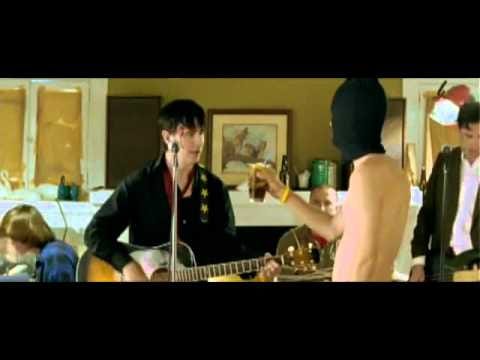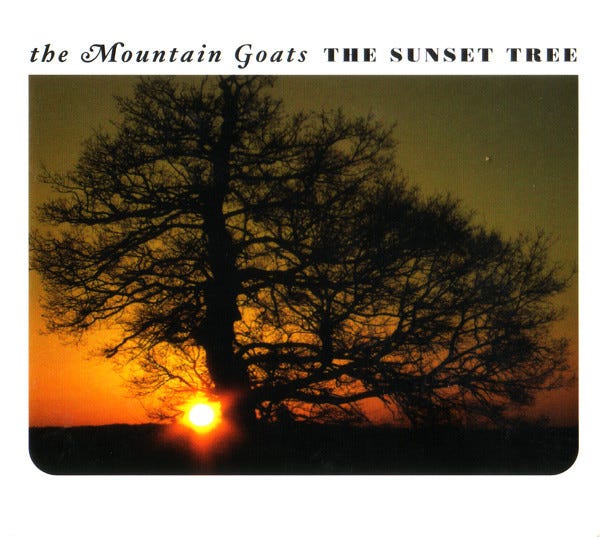The Mountain Goats "The Sunset Tree" provided endless, cathartic freakout moments.
Songs packed with 'this is the best part of the song' turns of phrase.
“Twin high-maintenance machines.”
It’s hard to imagine a lyric with as much clunky-cool brute force, such nerdy high energy, such a desperate yawp of self-understanding. Despite its uncommon syntax and contextually complicated expression, this is the moment of the song you can barely wait to sing along with.
The Mountain Goats’ 'The Sunset Tree’ is an album full of such moments: freakout moments, “a-ha” moments, moments of precise understanding and emotional depth. This is a moment of perfect clarity both narratively and in the band’s singular understanding of pop music. They are moments that get stuck in your head but, unlike the catchy choruses inherent to other songs (even other Mountain Goats songs), the ones presented on ‘Sunset’ are rarely easy.
“Twin high-maintenance machines” hits in the middle of ‘This Year’, a plaintive prayer of survival made by a man looking back on a particularly traumatic afternoon when he was seventeen. The twin high-maintenance machines in question are that seventeen-year-old kid and Cathy, ‘a girl that wants a little of [his] time’, and the sentiment betrays a knowledge, attained in retrospect, of how troubled they must have been. How dramatic and bombastic: in four abstract words, songwriter John Darnielle locks an understanding into the listener's mind: these kids aren’t just in trouble, they are trouble.
Another moment hits in the song preceding, ‘Broom People’. After a feint when the song edges up to a freakout moment at the end of a verse that doesn’t quite lead to a chorus (“down in your arms, in your arms, I am a wild creature”), the song concludes “I write down good reasons to freeze to death/in my spiral ring notebook/and in the long tresses of your hair/I am a babbling brook”.
‘Broom People’ is the second song on the album, so when Darnielle belts out ‘babbling brook’, it isn’t expressly clear that this is an album about child abuse, and that these abstractions of self-identity are expressions of that violence. Our narrator is a wild creature for good reason: he is in conflict.
‘This Year’, which is about a day spent fucking off and drinking with a girl he likes, is also ultimately about this violence: the song ends with the implied conflict he has with his stepfather upon returning home.
I didn’t realize what I was getting myself into when I picked up The Sunset Tree not long after its release in 2005, though my tendency to obsess over liner notes means that I was likely clued into what was going on before the album finished playing the first time through: Darnielle insists that the album was made possible by his own then-recently deceased stepfather (“may the peace which eluded you in life be yours now”), and goes on to dedicate the album:
“Dedicated to any young men and women anywhere who live with people who abuse them, with the following good news:
you are going to make it out of there alive
you will live to tell your story
never lose hope.”
With that bombshell dropped, the proliferation of ‘a-ha moments’ and freakouts is all the more powerful and heartfelt. Each small, sing-along epiphany of these songs becomes a moment in which you join a legion of the abused as you sing along, and your voice joins Darnielle’s to become but a fraction of some holy prayer of survival. You’re lending your voice to a magic spell of implied and desperately needed liberation.
The narrator seeks that liberation in a romance and fast drive in ‘Dilaudid’: “so kiss me with your mouth open/turn the tires toward the street/and stay sweet” begins our escape, and “You know it breaks my heart in half, in half/When I see them trying to fly/'Cause you just can't do/Things your body wasn't meant to/Hike up your fishnets/I know you” explains both why the escape is needed and also the true path that’s being taken: this drive isn’t going to get him out of here, but maybe she will.
The ‘a-ha’, the freakout, is here: “if we live to see the other side of this/I will remember your kiss/so do it with your mouth open/and take your foot off the break/for Christ’s sake”.
In ‘Dance Music’, the boy needs to cover up the noise of his parents fighting, and the phrase “so this is what the volume knob’s for”, though by no means a turning point in the song, is so poignant and effective that the real power moments of the song seem elevated: we’ve already heard the heart of the matter. Now let’s hear the struggle.
Like ‘Broom People’, ‘Lion’s Teeth’ abstracts identity. Where the former sees a boy unable to retain his selfhood, the latter makes the stepfather the much more obviously dangerous lion. Here the boy reaches into a mouth to “grab hold of one long, sharp tooth/and hold on”. Even the instrumentation of the song — choppy chords, understated but bombastic drums, frenetic slashes of strings — sounds like a confrontation, a fist fight. These ‘a-ha’ moments occur with a flowing swell of those strings; the conflict becomes beautiful.
The Sunset Tree contains multitudes of these simple but powerful moments — sometimes multiple times per song — so that even the most visceral and horrifying aspects of the song narratives read as pop music, as catchy and infectious. One can’t imagine being a child in need of escape listening to a man on the other side of his torture, celebrating.
But that celebration does not come, as one might expect, at the expense of the abuser — at that violent stepfather. Even when the lyric hits, during ‘Pale Green Things’, that “my sister called at three am/just last December/she told me how you’d died at last (at last)” it does not hit with a sense devoid of sorrow. That parenthetical repetition of ‘at last’ might be malicious, but it is maliciousness earned, and still carries the complicated feelings of family, of pain, of trauma. Darnielle manages, as the album closes, an earnestness he has refined through the twelve preceding songs.
Further Never News Album Discussions:






This is one of those all-time, load-bearing, foundational-type records.